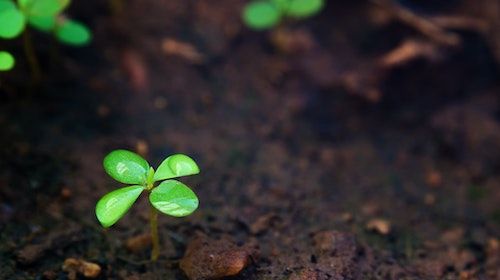
07 January 2022
We’re starting the new year with two of the UK’s largest farming conferences, where the importance of soil was discussed in several online panels and fringe events. Our Week in Soil series will begin with a quick summary of these and cover the latest soil stories from the end of 2021 and the start of 2022.
To begin with, Secretary of State for Environment, Food and Rural Affairs George Eustice spoke at the Oxford Farming Conference on Thursday, setting out how Local Nature Recovery and Landscape Recovery, two post-Brexit Environmental Land Management (ELM) schemes, will bring up to 60% of England's agricultural soil under sustainable management by 2030. The Secretary of State also reiterated that the first scheme under ELM, the Sustainable Farming Incentive (SFI), will begin with soil and stated that soils were “probably the single most important ecological building block in the farmed landscape”.
On Wednesday at the Oxford Farming Conference, the Green Alliance presented their new report on agri-carbon markets. The report highlights the benefits of working within the food supply chain to reduce emissions and sequester carbon and the need for strong standards, including a to ensure carbon is accurately measured and safely stored.
At the same time, the Oxford Real Farming Conference (ORFC) heard from 500 speakers from across the globe to highlight the alternatives to conventional farming and to offer all farmers a different kind of farming conference. A number of sessions covered the importance of soil health, including an online panel hosted by us and the Soil Association on ‘Getting Soils In SHAPE - Putting Soils At The Heart Of UK Farming Policy’. All the sessions will be available to watch or rewatch on the ORFC youtube channel.
A new report by the UN Food and Agricultural Organisation (FAO) has unveiled that human action causes degradation in 1.66 billion hectares of land. Entitled ‘The State of the World’s Land and Water Resources for Food and Agriculture: Systems at Breaking Point’ (SOLAW 2021), the report offers solutions away from the business-as-usual approach to make necessary transformation at the roots of the global food systems - water, land and soils.
In Northern Ireland, Agriculture Minister Edwin Poots has launched a consultation on the policy proposals for the Future Agriculture Policy. The aim will be to try to reduce greenhouse gas (GHG) emissions from farming, Northern Ireland’s highest emitting sector. The consultation will close on February 15.
Late in December, Defra launched a consultation on their proposed measures to end the retail sale of peat in England and Wales. Responses must be submitted by March 18.
Fertilizer costs have reached their highest peak in 12 years and China has announced the suspension of fertilizer exports until June 2022 to ensure domestic availability amid food security concerns. In light of this, experts are urging farmers to turn to soil tests as a focus on preliminary soil analysis represents a crucial tool to limit excessive and inefficient use of additives.
The European Commission has launched a call for proposals for the EU Mission ‘A Soil Deal for Europe’. Under Horizon Europe, research and innovation will be funded in order to protect and restore soils in Europe and beyond. The deadline for applications is March 24.
Two soil-related books have been published in the new year. ‘Unearthed’ by Claire Ratinon discusses race, roots and soil, to tell the story of how the author found belonging by coming back to the soil and reconnecting with nature. The second, ‘Designing Regenerative Food Systems’ by Marina O'Connell, offers a toolkit for regenerative food growing with a focus on healthy soil in a low input, closed loop system.